READFIELD — Annie Reiter saw the little boy every day, and every day the little boy waved. Sometimes, he would approach to show Reiter whatever new toy he was playing with with that day, but the little boy always waved.
Annie and her husband, Michael Conley, had decided to adopt a child from a children’s home in Yekaterinburg, Russia, a city 600 miles east of Moscow, where Europe becomes Asia. Annie visited the orphanage every day to spend time with Tonia, an 8-year-old girl who would soon be her daughter.
“I’d visit her every day, and there’d just be this little boy across the way, ‘Look at me! Look at me!'” Annie Reiter said. She spoke with Michael and it was apparent the couple would be adopting two Russian children.
The little boy, Ruslan, is 17 now (18 in April, he pointed out), and like his sister, Tonia, is now 100 percent American. The Maranacook Community High School senior is interested in sports, aviation and hanging out with buddies. He also represents his country as a member of the United States Paralympic Nordic ski team.
Reiter was born with a limb difference. His right hand ends just below the wrist. In December, he made his international Nordic skiing debut, competing for Team USA in Finland.
Ruslan did well enough to earn a spot in the Paralympic World Cup in March in Pyeongchang, South Korea, site of the 2018 Winter Paralympics. If he does well, Ruslan could earn a spot on the U.S. national team for the Paralympics next year. That would be an incredible feat for a skier of Reiter’s experience, said Maranacook Nordic ski coach Steve DeAngelis, who watched video of Reiter’s race in Finland and marveled at how much smaller the young man was when compared to his competition, mostly adults with international race experience.
“Every one of those athletes are, like, twice Ruslan’s size. They’re much more muscular. On our team, Ruslan’s known on the team for being ridiculously jacked. No one on the team would want to wrestle him,” DeAngelis said. “For a Nordic skier, 18 is really young. It takes a long time to develop that kind of aerobic capacity. The interesting thing will be to see how does he stack up against the other Nordic skiers.”
In December, Reiter competed in his first World Cup, in Vuokatti, Finland. He placed 21st in the 2.5 kilometer sprint, and 15th in the 15K biathlon.
“This is the first time I did a biathlon in my life,” Reiter said. “I was a little bit nervous. I was competing against the best para-athletes in the world. I was expecting to get my butt kicked, and I did. It’s so cool; I could learn just by watching these athletes. It was pretty cool being in the races, too.”
Eileen Carey, Team USA’s Paralympic Nordic skiing head coach and a Leeds native, hailed Reiter’s international debut as a success.
“I think Finland was a great experience for Ruslan and he performed well, especially for his first international competition. It was important for him to see just how fast the top guys in his field are skiing but also recognize that he could be there some day,” Carey said in an email. “Ruslan is someone who can be on the podium at the 2022 Games in Beijing, so right now success means steady improvements in fitness, technique, racing tactics, and all the details of preparation it takes to be a world-class skier.
“Ruslan has a big future in Nordic skiing. He has what it takes to be on the podium at Paralympic Games if he continues to put in the training hours and massive commitment it takes to be the best in the world.”
THE BEGINNING
Reiter began Nordic skiing in seventh grade, with encouragement from Zachary Holman, one of his best friends.
“In sixth grade I did basketball. After basketball that year, I said, ‘This is it. I’ve had it. It’s not my sport. Zach mentioned I should do Nordic. I’ll give it a shot. I had a good year, and hey, I like this sport,” Reiter said.
Holman thought his friend was a natural fit for Nordic skiing.
“I grew up Nordic skiing. It’s something I enjoy and Ruslan did running. I said, ‘Well, you like endurance sports. Why don’t you do Nordic skiing as well?’ Ruslan saw it originally as a way to get better at running, keep his endurance up. I think he kind of grew to love it, and now it’s one of his favorite things to do,” Holman said.
Ruslan’s path to the national team began with a race at Titcomb Mountain in Farmington when he was a sophomore. Tom Upham, a Wilton native who was a member of the United States Nordic team at the 1968 Winter Olympics, watched Reiter race that day, and called his son, James.
James Upham is a Nordic coach with the national Paralympic team. He coached athletes at the 2014 Winter Games in Sochi, Russia. When he, Carey and John Farra, the director of High Performance for Paralympic Nordic Skiing, looked into Reiter more, they saw an athlete with national team potential. When they first spoke with Reiter, he was unfamiliar with Paralympics.
But the more Reiter thought about it, the more the Paralympics intrigued him.
“I got more information, thought this is a pretty cool opportunity and I might as well take it,” Reiter said.
IMPROVING TECHNIQUE
In May 2016, Reiter was invited to participate in a training camp in Bend, Oregon. There, coaches evaluated his performance and offered advice on everything from ski technique to nutrition and weight training.
“We worked a lot on technique stuff there. They’d show me how and recommend skiing this way,” Reiter said.
Reiter always has found ways to compensate for his lack of a right hand his entire life. Since the time he began Nordic skiing in seventh grade, he overcame his disability by pushing one pole between his legs. That worked for him, until coaches at the Bend camp showed Reiter how to use his body to gain speed and pole with one arm.
“You love to see somebody try to innovate,” Farra said of Reiter’s self-taught method. “It didn’t take long to show him. We showed him how fast these guys were moving even without a ski pole in a second hand.”
With more upper body motion, skiers using one pole are able to add a little distance with each stroke. While Reiter cannot use his right arm to propel himself with a pole, he can use that arm as a lever, generating power to transfer his weight to the other side and gain speed. That subtle improvement can add an inch to each glide.
While that doesn’t seem like much, think of adding an inch to each glide thousands of times over a race and the difference becomes clear.
“I think he would agree he’s not there yet. It’s not there, but when he finds that, when it’s second nature, it’s going to be fascinating,” Farra said.
“Ruslan is successful at many things because he is willing to do them, find out what works, what needs tweaking and change what needs to be changed. I would bet that he identifies as a skier who happens to ski with one pole, not as a one-handed skier,” added Carey, the U.S. Paralympic Nordic ski coach. “His willingness to jump in with his peers and do the things he is interested in and just figure out what modifications he might need to make along the way make him both a great athlete and will bring him success at many things in his life. Ultimately, it’s probably the same traits that any of us use to try to master anything.”
When Reiter returned to his Maranacook team this winter, DeAngelis noticed the improvement immediately.
“He gets a greater range of motion that way. He’s generating momentum with his arm swing. He swings his arm up much higher,” DeAngelis said.
‘I WAS SHOCKED’
The trip to Finland was intended as another teaching tool for Reiter. Farra and Carey wanted their protege to see how skiers conduct themselves in a hyper-competitive setting. They wanted Reiter to get a taste of what he’d be in for if he pursued competitive skiing.
“Racing against a strong international field will provide invaluable experiences, and ultimately we hope that Ruslan and other developing athletes will learn and grow from those experiences. We are less concerned with getting into the nitty-gritty of results. If all the pieces are there, the results will follow,” Carey said.
Skate skiing always came easier to Reiter, so much that DeAngelis said as Reiter was still a novice he would often come up with excuses to avoid classical skiing. Classical skiing involves alternating motion of the arms and legs, often staying in tracks grooved into the snow. In skate skiing, the skier’s skis are pointed in a V, with power coming mostly from the legs, as is the case with a speed skater.
“I always make him do classic. When he was first on the team, he would do everything to try to avoid classic races. You know, ‘I’ve got a headache today. My hamster died.’ Whatever excuse he could come up with to avoid those classic races. Because it was much harder for him than skating,” DeAngleis said. “Skating, you generate so much power from your legs. I would tell him, ‘Ruslan, that is what’s going to make you a good skier. You’ve got to learn classic.’ He would reluctantly do it, because he’s a tough guy. Now he’s so much improved. Classic skiing is a dramatic improvement.”
At the World Cup in Vuokatti, Reiter’s race was classic-style. He didn’t know that if he did well enough, Reiter would be invited to join Team USA to compete in Pyeongchang in March. At the end of a team meeting in Vuokatti, Farra called Reiter to join him in front of the team, presented him with a blue team vest, and announced that Reiter had qualified for the next World Cup race in March.
“He was so great to have on the trip, eyes wide and soaking it all in. We looked at it as an opportunity to educate him,” Farra said. “When we were in Finland, he surprised us and even himself.”
Added Reiter, who is still surprised by the entire thing: “I was shocked.”
Along with giving Reiter the opportunity to see top-notch international competition, Farra said the World Cup allowed Reiter to become classified, which dictates against which skiers he will compete. Farra said Reiter is LW8, which means he’ll compete against other standing skiers missing an arm, both arms in some cases, or athletes missing one leg below the knee. Even on the phone, Farra’s enthusiasm for Reiter’s potential is obvious, when he chuckles and talks faster when discussing Reiter’s future.
“We’re excited to work with him. We run a really professional team, and I think he got that when he went to Finland. We’re not a ragtag group,” Farra said.
Farra, Carey and the rest of the national Paralympic team are finding out what Reiter’s friends have known for years.
“We joke, Ruslan’s good at everything. Any sport he does, he’s just phenomenal at it. He picked it up and started getting better and better and better,” Holman said.
EARLY YEARS
Reiter’s earliest years in Russia might as well have been another life. When he watches old home movies, made in Russia in 2002 as the adoption process played out, he has no idea what he’s saying. The Russian language is in his brain somewhere, in storage, waiting for when it could be useful again.
Right now, that filing cabinet is locked.
“It’s back there somewhere,” Ruslan Reiter said, pointing at his head. “I don’t really remember a whole lot about Russia. Very vague memories, not strong ones.”
First, the family lived in Framingham, Massachusetts, where a large Russian population helped keep Ruslan and Tonia connected to their roots. There were Russian baby sitters, Russian piano teachers. Conley remembered hearing the children talk in Russian, and wondering: What are they saying about us?
Reiter always was an energetic athletic kid, his parents said. Often, there were calls from school following one of Reiter’s misadventures.
“It would start with, ‘Don’t worry, everything’s OK, but …'” Conley said.
Tonia and Ruslan bonded in the children’s home. Tonia, 21, remembers how excited she was when told Ruslan would be her little brother.
“Ruslan and I, we’re really close. We’ve always kind of helped each other excel at (sports). I like to bike, for example. He would always bike with me or push me, and I’d push him. That’s one of our stronger connections, through athletics,” she said.
With his friends, Reiter downplays his skiing success. When he returned home from the initial training session in Oregon, Reiter’s stories of the experience focused on how sore he was from the intense workouts.
“If you met him, you’d never know he’s this phenomenal athlete. He’s so humble and easygoing. If you talk to him about it, he’s ‘Yeah, I’m going to Finland to compete with the Paralympic team.’ He plays it down,” Holman said.
“Ruslan has been someone I look up to a lot when I’m trying to improve my skiing,” added Connor Firth, Reiter’s teammate on the Maranacook Nordic team, said. “When I’m out on the course and I can feel myself struggling, I know there’s people who have it harder than I do, and they’re miles ahead of me in terms of skill.”
MAKING HIS OWN PATH
The national team experience definitely has changed Reiter, and his friends and family see it. He was never a wallflower, but now, particularly since his return from Finland, Reiter is more assertive. New confidence permeates his entire life. Reiter’s teachers notice he’s more talkative in class, DeAngelis said.
“One of the things we like so much about this opportunity is how he’ll be able to take whatever comes of it and launch him,” Conley said. “He’s made his own path. He works hard at being a Nordic skier and a cross country runner. He works hard at being a middle distance runner for the track team. He’s made great strides as a student.”
Carey keeps tabs on Reiter through updates from DeAngelis.
“I try to fill in some things that might be helpful, like sending video from World Cups, so he and his coaches can see the technique of the best skiers in the world who ski with one pole,” Carey said. “Ultimately he can do what he needs to do to make big improvements with the great network of coaches and teammates he has in Maine.”
Reiter’s parents were concerned about the time he’d miss in school while overseas, but working closely with his teachers has kept Reiter on track to graduate from Maranacook this spring. Reiter said he may delay college to pursue his opportunities with the national team, but he is looking at studying either occupational therapy at Kennebec Valley Community College in Fairfield or aviation at the University of Maine at Augusta. Aviation is a special interest to Reiter, who enjoys flying and is looking forward to traveling to South Korea in March for his next World Cup event.
“He likes to look up the plane he’s going to be flying in,” Conley said. “He looks it up and goes, ‘Oh yeah, that’s a cool plane.'”
If Reiter doesn’t qualify for the 2018 Paralympics in March, his next chance will be in World Cup races next December, in Calgary, Alberta.
Still relatively new to his sport, Reiter’s Nordic ski career is taking off. Sooner or later, if he continues to improve, that little boy will wave to his mom from the medal podium.
Travis Lazarczyk — 861-9242
tlazarczyk@centralmaine.com
Twitter: @TLazarczykMTM
Send questions/comments to the editors.


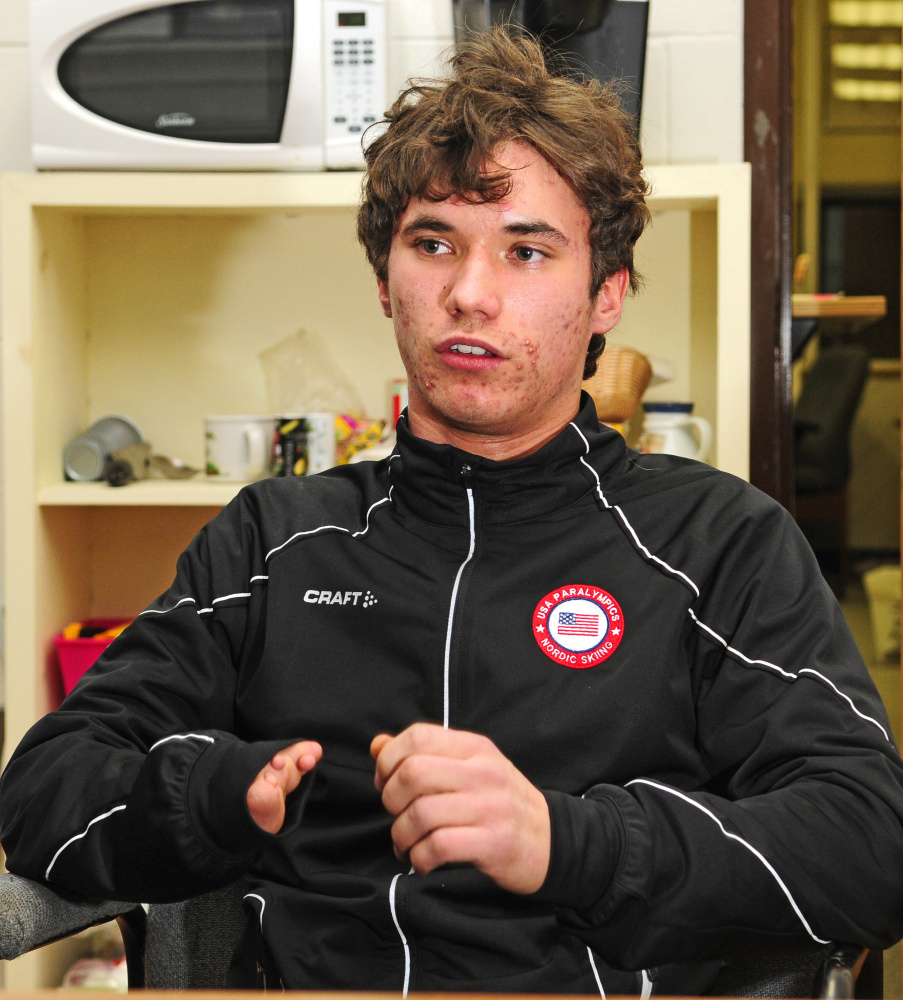
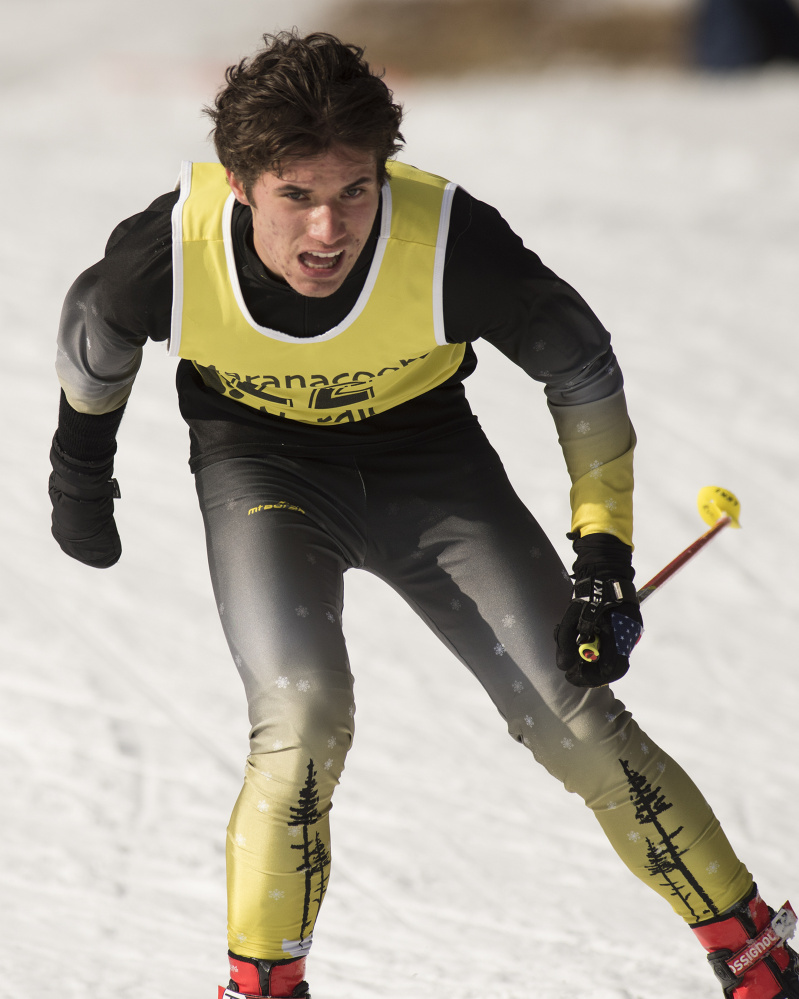
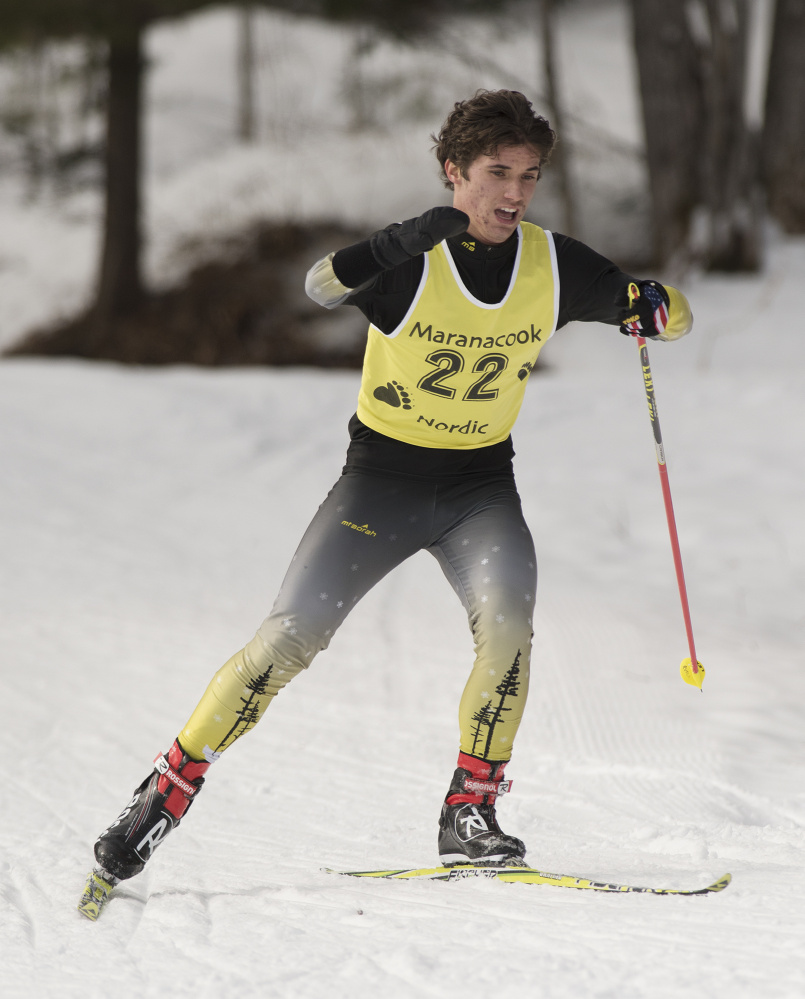
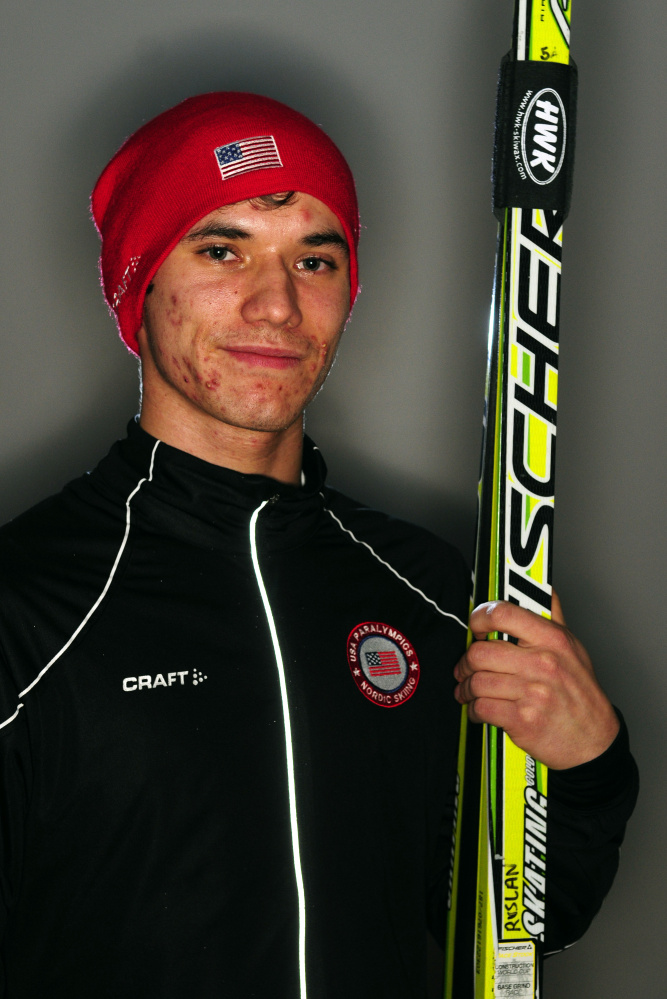
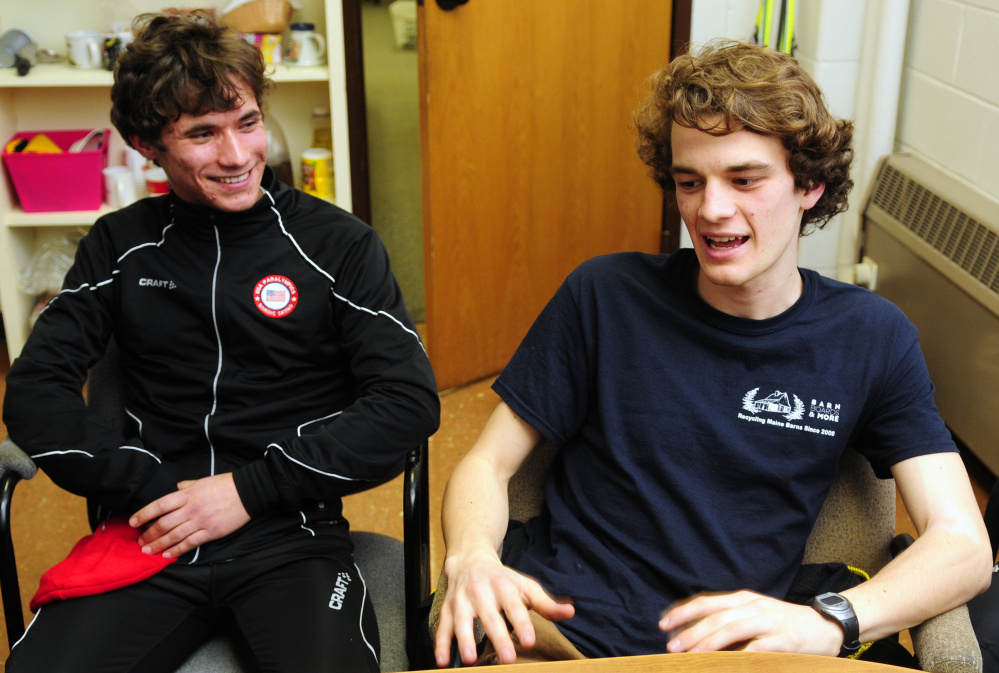

Success. Please wait for the page to reload. If the page does not reload within 5 seconds, please refresh the page.
Enter your email and password to access comments.
Hi, to comment on stories you must . This profile is in addition to your subscription and website login.
Already have a commenting profile? .
Invalid username/password.
Please check your email to confirm and complete your registration.
Only subscribers are eligible to post comments. Please subscribe or login first for digital access. Here’s why.
Use the form below to reset your password. When you've submitted your account email, we will send an email with a reset code.